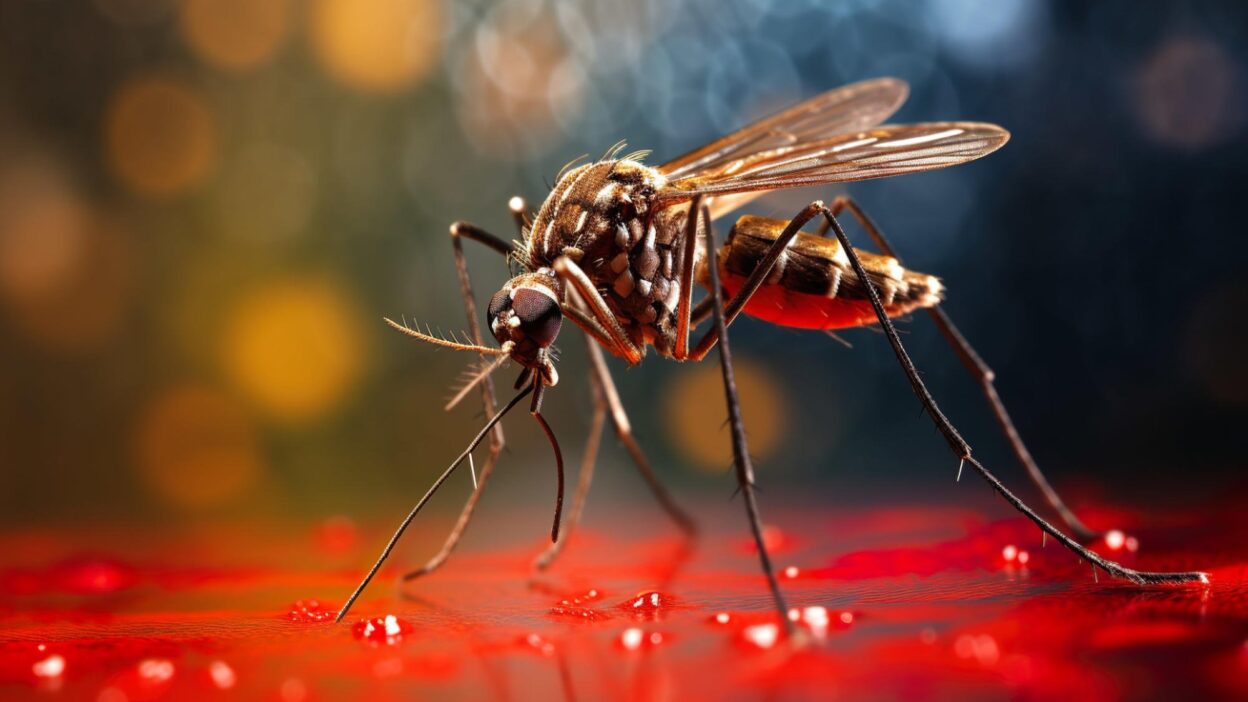Malaria remains one of Nigeria’s biggest public-health challenges. It’s caused by a parasite transmitted by infected Anopheles mosquitoes, and although it’s preventable and treatable, the disease still causes millions of illnesses and thousands of deaths each year especially in children under five and pregnant women. Early recognition, prompt testing and the right treatment save lives; prevention protects communities and workplaces.
What is malaria?
Malaria is an infectious disease caused by microscopic parasites of the Plasmodium family that are transmitted to people through the bite of infected Anopheles mosquitoes. Once inside the body the parasite multiplies in the liver and then invades red blood cells, causing fever, chills, headache, fatigue and, if not treated promptly, severe complications such as anaemia, breathing problems, organ failure or death. Malaria is preventable and treatable, early testing and the right antimalarial medicines save lives, while mosquito control (nets, spraying, environmental cleanup) and vaccines help reduce transmission at the community level.
How malaria spreads
Malaria parasites (most often Plasmodium falciparum in Nigeria) are carried by Anopheles mosquitoes that bite mainly at night. A mosquito becomes infectious after biting a person who has malaria; when the mosquito later bites another person, it can pass the parasite on. This cycle; plus seasonal rains and local conditions that produce mosquito breeding sites, drives outbreaks and steady transmission across many parts of Nigeria.
Common symptoms
Symptoms usually start 7 – 14 days after infection but timing varies. Typical, uncomplicated malaria symptoms include:
- Fever (often high) with chills and sweating
- Headache and muscle aches
- Tiredness, nausea, vomiting, loss of appetite
- Sometimes cough or diarrhoea (especially in children)
Because symptoms overlap with other infections, testing is essential, don’t assume a fever is “just malaria.” If not treated, malaria can quickly become severe.
Severe malaria – red flags (seek urgent care)
Severe malaria is a medical emergency. Seek immediate care if you or someone else has malaria symptoms plus any of:
- Difficulty breathing, severe breathlessness or very rapid breathing
- Confusion, seizures or unconsciousness
- Extreme weakness or difficulty standing/walking
- Persistent vomiting and inability to take oral medicines
- Very high fever, jaundice (yellow eyes/skin), or blood in urine/stool
Severe malaria requires urgent parenteral (injectable) treatment and hospitalization. Timely action saves lives according to the World Health Organization.
How malaria is diagnosed
Accurate diagnosis before treatment is the standard of care. Common methods:
- Rapid Diagnostic Tests (RDTs): quick, simple tests used at clinics and community sites; give results in 15 – 20 minutes.
- Microscopy (blood smear): gold-standard in experienced labs, identifies species and parasite density.
- PCR: used for research or specialized diagnosis, not routine in most clinics.
Always confirm malaria with a test before giving antimalarials when possible — this helps prevent mis-treatment and tracks true malaria burden.
Treatment – what works now
For uncomplicated P. falciparum malaria (the most common severe kind in Nigeria), artemisinin-based combination therapies (ACTs) are the WHO-recommended first-line treatment. For severe malaria, injectable artesunate followed by a full ACT is the recommended approach. Prompt, full-course treatment reduces complications and helps prevent transmission. Health systems must monitor for emerging drug resistance and follow national treatment guidelines. Read more at World Health Organization
Drug resistance – why it matters
While ACTs remain effective across much of Africa, partial artemisinin resistance is a growing global concern in some regions and needs close monitoring. That’s why confirmed diagnosis, correct dosing, and pharmacovigilance (safety and resistance monitoring) are essential parts of malaria programs.
Prevention – what actually works (and WHO recommendations)
Two vector-control measures are the backbone of malaria prevention in endemic countries:
- Insecticide-Treated Nets (ITNs / LLINs): sleep under a long-lasting treated net every night.
- Indoor Residual Spraying (IRS): spraying durable insecticide on interior walls where mosquitoes rest.
WHO recommends deploying ITNs and/or IRS depending on local risk and resources; in some settings both are used together for greater impact. Complementary actions (environmental management, larval source control in urban settings, and regular community education) further reduce transmission.
Recent trials also show that next-generation nets with additional insecticides can significantly reduce malaria where mosquitoes are resistant to older pyrethroid nets, an important advance for high-burden countries.
Special groups: children and pregnant women
- Children under five carry the highest risk of severe disease and death. Rapid testing and treatment, plus preventive measures (ITNs, seasonal malaria chemoprevention where used), are priorities. According to the World Health Organization
- Pregnant women face higher risk of severe malaria and poor birth outcomes. WHO recommends intermittent preventive treatment in pregnancy (IPTp) with sulfadoxine–pyrimethamine (SP) during routine antenatal visits in areas with moderate-to-high transmission; ITNs are also essential. Coverage gaps remain a major challenge in many settings and improving antenatal delivery of IPTp is a top public-health goal.
New tools: malaria vaccines
Recent WHO recommendations and pilot rollouts of malaria vaccines (RTS,S and the newer R21) mark an important advance for child protection in high-burden areas. Nigeria began introducing the R21 vaccine in pilot areas in 2024 as part of broader control strategies; vaccines add another layer of protection, particularly for young children but do not replace nets, treatment or vector control.
Practical advice for families
- If a child or adult has fever, get them tested (RDT or microscopy) as soon as possible. Don’t delay.
- Use and repair bed nets, hang them properly and sleep under them nightly.
- Clear standing water around houses (containers, blocked drains) to reduce breeding sites.
- Seek care quickly for red-flag signs (see “Severe malaria” above).
- Keep antimalarial medicine only when prescribed by a clinician; avoid self-treating without testing.
What employers, schools and NGOs can do (program-level actions)
- Organize regular malaria awareness and testing days at worksites or schools with partner providers.
- Provide ITNs for workers or students in high-risk areas and promote their use.
- Implement targeted IRS in workplace housing, boarding schools or factory dormitories where feasible.
- Ensure rapid referral pathways from school or occupational clinics to higher-level care for suspected severe malaria.
- Include malaria actions in workplace health programs and health & safety plans; prevention protects attendance and productivity.
Travellers – simple checklist before you leave
If you’re travelling to or from Nigeria (or internally across risk zones):
- Discuss prescription prophylaxis with a clinician (e.g., atovaquone-proguanil, doxycycline or mefloquine; choices depend on destination, medical history and resistance patterns). Start as recommended, continue during travel and after return as directed.
- Use mosquito bite prevention (nets, repellents, long sleeves at night).
- Carry an action plan: where to test and seek care locally.
Quick facts & the current picture
- Malaria causes hundreds of millions of cases globally and hundreds of thousands of deaths each year; the WHO’s World Malaria Report documents trends and where efforts must accelerate. Nigeria carries a disproportionate share of the global burden and remains a strategic priority for elimination efforts.
When to see Pretty Health Care
Pretty Health Care offers workplace and school malaria prevention support, testing (RDTs & microscopy), referrals for treatment, community education, and coordination of ITN distribution or on-site spraying where appropriate. If you’d like a Malaria Wellness Day for staff, a school screening and net distribution, or advice for a travel health plan, call +2348114346325 or visit https://prettyhealthcare.com.ng/.
Short checklist
- Test fever cases promptly (RDT or microscopy).
- Treat confirmed malaria with recommended ACTs; severe cases go to hospital.
- Sleep under an ITN every night.
- Clear standing water within 48 hours.
- Pregnant women: attend ANC and receive IPTp as advised.
- Employers/schools: schedule malaria awareness + screening events.




